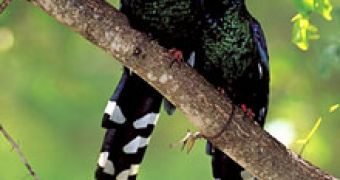The theory says that the earlier you start sex life, the larger is the number of kids you will have.
At least in the animal world.
But this concept, one of the biggest assumptions in behavioral ecology, has been proven to have its cracks, as showed by a team from the universities of Bristol and Cape Town.
Its research focused on green woodhoopoe, an African cooperative bird species that live in groups of 2-12 individuals in which only one pair breeds per season.
The other individuals help the dominant couple in raising its offspring, while delaying their breeding.
That's why, even if both males and females reach sexual maturity at one year of age, individuals may begin breeding at several years old.
The information achieved in 24 years pointed that the females that began breeding later in life actually produced more offspring than those that started earlier.
They lived longer, had longer breeding careers, and thus delivered more fledglings.
This was not the case of males: delayed start translated into fewer offspring.
The surprising and apparently paradoxical pattern could be linked to a higher mortality of the females that start breeding early in life.
"It has been generally assumed that males and females suffer similarly from a delayed start to breeding, and many studies have investigated how non-breeding birds might mitigate this assumed cost. However, as in many facets of life, the sexes differ dramatically: although male woodhoopoes do indeed suffer if they don't start breeding as soon as possible, females do best to wait a while." said Dr Radford, from Bristol University's School of Biological Sciences.
It seems that young females are not as fit as older females when attempting to breed.
Breeding female woodhoopoes lay all the eggs and effectuate all the incubation, facts that require high cost.
While incubating during the night, the breeding female sleeps alone, while the rest of the group roost communally; she therefore wastes more energy for thermoregulatorion, added to the costs of egg laying and incubation.
This may exhausts the organisms of the young females that are in poorer condition than older females, raising their death probability.

 14 DAY TRIAL //
14 DAY TRIAL //